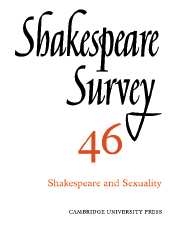Book contents
- Frontmatter
- Shakespeare and Sexuality
- As Who Liked It?
- Malvolio and the Eunuchs: Texts and Revels in Twelfth Night
- The Scandal of Shakespeare’s Sonnets
- Weaving and Writing in Othello
- ‘That’s She that was Myself’: Not-so-Famous Last Words and Some Ends of Othello
- ‘The Catastrophe is a Nuptial’: The Space of Masculine Desire in Othello, Cymbeline, and The Winter’s Tale
- Reconstructing The Winter’s Tale
- Late Shakespeare: Style and the Sexes
- The Virgin Not: Language and Sexuality in Shakespeare
- Fleshing his Will in the Spoil of her Honour: Desire, Misogyny, and the Perils of Chivalry
- Bowdler and Britannia: Shakespeare and the National Libido
- Shakespeare and the Ten Modes of Scepticism
- Shakespeare Performances in England, 1992
- Professional Shakespeare Productions in the British Isles, January-December 1991
- 1 Critical Studies
- 2 Shakespeare’s Life, Times, and Stage
- 3 Editions and Textual Studies
- Books Received
- Index
The Scandal of Shakespeare’s Sonnets
Published online by Cambridge University Press: 28 March 2007
- Frontmatter
- Shakespeare and Sexuality
- As Who Liked It?
- Malvolio and the Eunuchs: Texts and Revels in Twelfth Night
- The Scandal of Shakespeare’s Sonnets
- Weaving and Writing in Othello
- ‘That’s She that was Myself’: Not-so-Famous Last Words and Some Ends of Othello
- ‘The Catastrophe is a Nuptial’: The Space of Masculine Desire in Othello, Cymbeline, and The Winter’s Tale
- Reconstructing The Winter’s Tale
- Late Shakespeare: Style and the Sexes
- The Virgin Not: Language and Sexuality in Shakespeare
- Fleshing his Will in the Spoil of her Honour: Desire, Misogyny, and the Perils of Chivalry
- Bowdler and Britannia: Shakespeare and the National Libido
- Shakespeare and the Ten Modes of Scepticism
- Shakespeare Performances in England, 1992
- Professional Shakespeare Productions in the British Isles, January-December 1991
- 1 Critical Studies
- 2 Shakespeare’s Life, Times, and Stage
- 3 Editions and Textual Studies
- Books Received
- Index
Summary
Of all the many defences against the scandal of Shakespeare’s Sonnets-Platonism, for example, or the Renaissance ideal of friendship – John Benson’s is undoubtedly the most radical. In order to cover up the fact that the first 126 of the Sonnets were written to a male, Benson in his 1640 Poems: Written by Wil Shake-speare. Gent. changed masculine pronouns to feminine and introduced titles which directed sonnets to the young man to a mistress. By these simple editorial interventions, he succeeded in converting a shameful homosexual love to an acceptable heterosexual one, a conversion reproduced in the numerous reprintings of the 1640 Poems up through the eighteenth century. The source for this account is Hyder E. Rollins’s authoritative 1944 variorum Sonnets, the first edition to detail Benson’s pronominal changes and titular insertions. Subsequent editions have reproduced his conclusions, for example John Kerrigan’s 1986 edition which faults Benson for inflicting on the Sonnets ‘a series of unforgivable injuries’, above all ‘a single recurring revision: he emended the masculine pronouns used of the friend in 1 to 126 to “her”, “hers”, and “she”’. With varying degrees of indignation and amusement, critical works on the Sonnets have repeated the charge.
The charge, however, is wrong. Benson did not attempt to convert a male beloved to a female. To begin with, the number of his alterations has been greatly exaggerated. Of the seventy-five titles Benson assigned to Shakespeare's sonnets, only three of them direct sonnets from the first group of the 1609 Quarto (sonnets 1-126) to a woman. Furthermore, because none of the sonnets in question specifies the gender of the beloved, Benson had no reason to believe a male addressee was intended.
- Type
- Chapter
- Information
- Shakespeare Survey , pp. 35 - 50Publisher: Cambridge University PressPrint publication year: 1993
- 3
- Cited by



